

The Narcissist's Addiction to Fame and Celebrity. The Narcissist's Addiction to Fame and Celebrity Frequently Asked Questions # 19 Narcissists pursue fame and celebrity relentlessly.
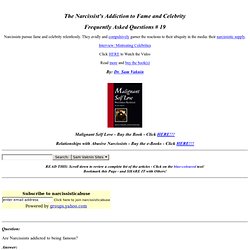
They avidly and compulsively garner the reactions to their ubiquity in the media: their narcissistic supply. Interview: Mistreating Celebrities Click HERE to Watch the Video Read more and buy the book(s) By: Dr. Malignant Self Love - Buy the Book - Click HERE!!! Relationships with Abusive Narcissists - Buy the e-Books - Click HERE!!!
READ THIS: Scroll down to review a complete list of the articles - Click on the blue-coloured text! Question: Are Narcissists addicted to being famous? Answer: The Celebrity-Icon. Teenagers learn about modern life through celebrity culture, says academic. Teenagers interested in celebrity culture are more likely to have a well-rounded knowledge of modern life and awareness of issues relating to politics, economics and the media, a leading Media Arts academic at Royal Holloway, University of London, has said.
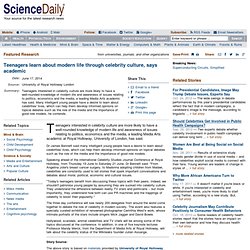
Dr James Bennett said many intelligent young people have a desire to learn about celebrities' lives, which can help them develop informed opinions on topical debates such as the role of the media and the importance of good role models. Speaking ahead of the international Celebrity Studies Journal Conference at Royal Holloway, from Thursday 19 June to Saturday 21 June, Dr Bennett said: "From Angelina Jolie's breast cancer surgery, to Madonna adopting children from Malawi, celebrities are constantly used to tell stories that spark important conversations and debates about moral, political, economic and cultural issues.
"Today's teenagers benefit from discussing these topics with their peers. Beautiful Minds, Scientific American Blog Network. In 2012, a study found that a desire for fame solely for the sake of being famous was the most popular future goal among a group of 10-12 year olds, overshadowing hopes for financial success, achievement, and a sense of community.

Which raises the question: Why do people want to be famous? John Maltby found six major reasons why people seek fame: Is Celebrity Obsession Destroying Our Society? The pedestal on which we have put movie stars, sports figures, and famous people could give some people neck strain.
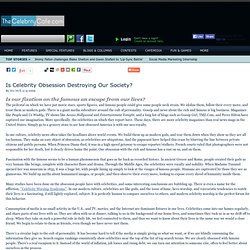
We idolize them, follow their every move, and treat them as modern gods. There is a giant media subculture around the cult of personality. Gossip and news about the rich and famous is big business. Magazines like People and Us Weekly, TV shows like Access Hollywood and Entertainment Tonight, and a long list of blogs such as Gossip Girl, TMZ.Com, and Perez Hilton have captured our imagination. More specifically, the celebrities on which they report have.
Inequality and the Modern Culture of Celebrity. The Culture of Celebrity. Once the famous were recorded for the ages in stone and in paint.
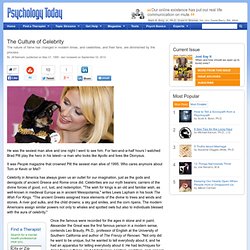
Alexander the Great was the first famous person in a modern sense, contends Leo Braudy, Ph.D., professor of English at the University of Southern California and author of The Frenzy of Renown. "Not only did he want to be unique, but he wanted to tell everybody about it, and he had an apparatus for telling everybody about it. He had techniques for doing famous things. The celebrity culture reader by Marshall, P. David. Has celebrity activism gone too far? 4 February 2011Last updated at 16:00 Sir Roger Moore, Cat Deeley and Naomi Campbell have all used their fame to help good causes Save the Children is the latest charity to launch a star-studded campaign.

But have good causes become too dependent on showbiz, asks Giles Edwards. Information about Celebrity Culture, what is it, the influence of the media. The Cultural Politics of Celebrity. Celebrities are a ubiquitous aspect of contemporary Western culture.
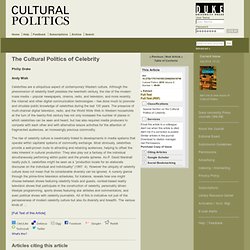
Although the phenomenon of celebrity itself predates the twentieth century, the rise of the modern mass media – popular newspapers, cinema, radio, and television, and more recently the Internet and other digital communication technologies – has done much to promote and circulate public knowledge of celebrities during the last 100 years. The presence of multi-channel digital television, radio, and the World Wide Web in Western households at the turn of the twenty-first century has not only increased the number of places in which celebrities can be seen and heard, but has also required media producers to compete with each other and with alternative leisure activities for the attention of fragmented audiences, an increasingly precious commodity.
The rise of celebrity culture is inextricably linked to developments in media systems that operate within capitalist systems of commodity exchange. Celebritycultureasastatussystem.pdf. Celebrity Culture - Ellis Cashmore. Celebrity culture and public connection: Bridge or chasm? Media and cultural research has an important contribution to make to recent debates about declines in democratic engagement: for example, is celebrity culture a route into democratic engagement for those otherwise disengaged?
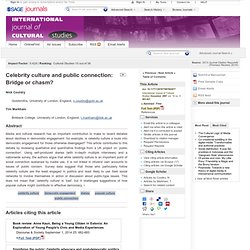
This article contributes to this debate by reviewing qualitative and quantitative findings from a UK project on `public connection'. Using self-produced diaries (with in-depth multiple interviews) and a nationwide survey, the authors argue that while celebrity culture is an important point of social connection sustained by media use, it is not linked in citizens' own accounts to issues of public concern. Survey data suggest that those who particularly follow celebrity culture are the least engaged in politics and least likely to use their social networks to involve themselves in action or discussion about public-type issues. Fashion and Celebrity Culture - Pamela Church Gibson. The interrelationship between fashion and celebrity is now a salient and pervasive feature of the media world.
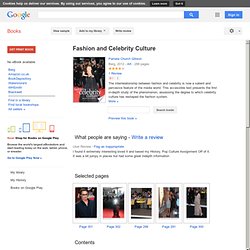
This accessible text presents the first in-depth study of the phenomenon, assessing the degree to which celebrity culture has reshaped the fashion system. Fashion and Celebrity Culture critically examines the history of this relationship from its growth in the nineteenth century to its mutation during the twentieth century to the dramatic changes that have transpired in the last two decades. It addresses the fashion-celebrity nexus as it plays itself out across mainstream cinema, television and music and in the celebrity status of a range of designers, models and artists.
Celebrity Culture and the American Dream: Stardom and Social Mobility - Karen Sternheimer. Sociology in the Age of Celebrity. Stargazing: Celebrity, Fame, and Social Interaction, by Kerry O.

Ferris, Scott R. Harris New York, NY: Routledge, 2011. 158pp. $25.95 paper. ISBN: 9780415884280. Tabloids, Reality Television and the “Ordinary” Celebrity Erin Meyers / Oakland University. Teen Mom’s Maci Bookout on the red carpet In my previous column, I explored the rise of reality television stars within tabloid magazines as part of broader shift in contemporary celebrity culture towards the private-self. In contrast to the extraordinary/ordinary divide more common in traditional conceptions of stardom, reality stars and tabloid coverage of them relies simply on a willingness to “be yourself” in public as a claim to fame.
How social media has changed what it means to be a celebrity. Even in the 1990s, the line between fame and obscurity was easy to find – this was before the advent of Paris Hilton and Kim Kardashian, when you were generally famous for being an actor or a sports star, a politician or a pundit. There were many paths to renown, but they all involved networking, going through agents, and “getting a big break.” You got your break, you became a public figure, then you gained fame. Media and the Restyling of Politics: Consumerism, Celebrity and Cynicism. Celebrity Society - Robert van Krieken. Media and the Restyling of Politics: Consumerism, Celebrity and Cynicism. Mintel’s 3 social media trends shaping the marketplace. Home / Press Centre / Technology / #Trending: Mintel identifies three social media trends that are shaping the consumer marketplace Published on September 5th, 2014 Chicago (September 5, 2014)—As timely as a tweet and invaluable as a Facebook birthday reminder, Mintel is back again with the latest social media trends update from social media analysts Gabi Lieberman and Lizz Martinez.
They have identified and highlighted three new trends in online consumer marketplace behavior this quarter that are helping shape the social media landscape. 1. User-generated content: “Marc Jacobs launched its #CastMeMarc contest in April 2014. “Allowing consumers to insert themselves into brands helps drive interaction, as noted by the #CastMeMarc levels of participation. 2. “CoverGirl tapped the influence of its celebrity spokeswomen for its ‘Girls Can’ campaign, launched during the 2014 Sochi Winter Olympic Games. How New Media has Changed the Definition of Celebrity and Celebrity Culture. Media and the Restyling of Politics: Consumerism, Celebrity and Cynicism. Have we got news for you – world news and the economy headline as nation’s most frequently followed stories. Published on March 9th, 2012 While the UK is frequently labelled as a celebrity obsessed nation, finds that when it comes to news, world news and the economy top the list as the nation’s most frequently followed news stories.
Latest research from Mintel reveals that, today, as many as four in 10 (39%) Brits follow the world news and the economy”a lot”, with just 10% admitting they have no interest in these areas whatsoever. In fact, Brits are almost four times as likely to follow these”real news”areas on a regular basis than softer stories such as celebrity gossip. Today, just 11% of Brits admit to following celebrity stories”a lot”while almost half (48%) the nation claims not to follow celebrity news at all.
George Zaborowski, Senior Financial Services Analyst at Mintel, said: “Media engagement in world news and the economy by UK adults is high. There are significant differences in consumer engagement by male and females. Framing Celebrity: New Directions in Celebrity Culture. Celebrity culture has a pervasive presence in our everyday lives – perhaps more so than ever before. How the meaning of celebrity has changed.
The celebrity culture reader by Marshall, P. David. Framing celebrity: new directions in celebrity culture by Redmond, Sean, 1967-, Holmes, Su. Celebrity and Power: Fame in Contemporary Culture - P. David Marshall. The Challenge of Cultural Elites: Celebrities and Social Movements - Meyer - 2007 - Sociological Inquiry. Narcissism and celebrity. The exploration of modern day “Celebrity culture”; its impact on the Fashion Industry and how this affects young females fashion clothing consumption. - Etheses. Anonymous, (2010) The exploration of modern day “Celebrity culture”; its impact on the Fashion Industry and how this affects young females fashion clothing consumption.
Other thesis, Queen Margaret University. This study aims to fully explore modern day “celebrity culture”; its impact on the Fashion Industry and how this affects young females fashion clothing consumption. The main objectives being; to find out from a consumers perspective to what extent celebrities influence/alter fashion clothing consumption, to discover if a brand is more appealing/credible in consumers minds if it is being worn/endorsed by a celebrity and to find out which celebrities are seen as “Style Icons”.
The project also aims to find out which forms of media consumers use to get celebrity fashion information. Repository Staff Only: item control page. M/C Journal: "Hypertrophic Celebrity" Bachelor Dissertation – Exploring Celebrity Culture. Celebs.socinq.pdf. The Kardashian phenomenon. When a reality show about the Kardashian sisters of Calabasas debuted in fall 2007, most people had never heard of the family and what was known could scarcely be considered positive. Their late father, a lawyer, helped O.J. Simpson win acquittal at his murder trial; middle daughter Kim palled around nightclubs with Paris Hilton; and a graphic sex tape featuring the brunet and a former boyfriend ended up in the hands of a porn distributor.
The Kardashians and their Media Empire… Keeping up with the Kardashians is one of the most popular shows in reality TV right now. It is a comedy/drama reality show that follows the family of the Kardashian/Jenner’s and what they do on a daily basis. Beyonce. The Woman. The Legend. The Brand. Keeping Up the Kardashian Brand: Celebrity, Materialism, and Sexuality - Amanda Scheiner McClain.
How Beyonce became a global brand. Celebrity Firms: The Social Construction Of Market Popularity. 9780521884778_frontmatter.pdf.